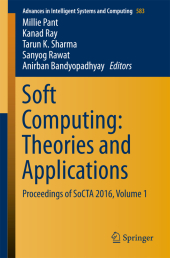 Neuerscheinungen 2017Stand: 2020-02-01 |
Schnellsuche
ISBN/Stichwort/Autor
|
Herderstraße 10
10625 Berlin
Tel.: 030 315 714 16
Fax 030 315 714 14
info@buchspektrum.de |

Anirban Bandyopadhyay, Millie Pant, Sanyog Rawat, Kanad Ray, Tarun K. Sharma
(Beteiligte)
Soft Computing: Theories and Applications
Proceedings of SoCTA 2016, Volume 1
Herausgegeben von Pant, Millie; Ray, Kanad; Sharma, Tarun K.; Rawat, Sanyog; Bandyopadhyay, Anirban
1st ed. 2018. 2017. xxii, 865 S. 302 SW-Abb., 75 Farbtabellen. 235 mm
Verlag/Jahr: SPRINGER, BERLIN; SPRINGER SINGAPORE; SPRINGER 2017
ISBN: 9811056862 (9811056862)
Neue ISBN: 978-9811056864 (9789811056864)
Preis und Lieferzeit: Bitte klicken
This book focuses on soft computing and its applications to solve real-life problems occurring in different domains ranging from medical and health care, supply chain management and image processing to cryptanalysis. It presents the proceedings of International Conference on Soft Computing: Theories and Applications (SoCTA 2016), offering significant insights into soft computing for teachers and researchers and inspiring more and more researchers to work in the field of soft computing.
The term soft computing represents an umbrella term for computational techniques like fuzzy logic, neural networks, and nature inspired algorithms. In the past few decades, there has been an exponential rise in the application of soft computing techniques for solving complex and intricate problems arising in different spheres of life. The versatility of these techniques has made them a favorite among scientists and researchers working in diverse areas. SoCTA is the first international conference being organized at Amity University Rajasthan (AUR), Jaipur. The objective of SoCTA 2016 is to provide a common platform to researchers, academicians, scientists, and industrialists working in the area of soft computing to share and exchange their views and ideas on the theory and application of soft computing techniques in multi-disciplinary areas. The aim of the conference is to bring together young and experienced researchers, academicians, scientists, and industrialists for the exchange of knowledge. SoCTA especially encourages the young researchers at the beginning of their career to participate in this conference and present their work on this platform.
Modified Critical-Path and Top-Level attributes (MCPTL) based Task Scheduling Algorithm in Parallel Computing.- Critical Path Problem for Scheduling using Genetic Algorithm.- A Robust Digital Image Watermarking Algorithm Using DWT and SVD.- A Novel and Secure Authentication Secret Key Generation Scheme Using Bilinear Self- Pairing Map Based on Elliptic Curve Cryptography.- Study and Comparatively Analysis of various Vulnerabilities occur in Google Chrome.- Secure Framework for Data Security in Cloud Computing.- An Improved Spider Monkey Optimization Algorithm.- Neural Network Based prediction of Productivity parameters.- Rigorous Data Analysis and Performance Evaluation of Indian Classical Raga Using RapidMiner.- EPQ Model with Product Stewardship Approach.- Loss and Cost Minimization with Enhancement of Voltage Profile of Distribution Systems Using a Modified Differential Evolution Technique.- Integration of GIS, Spatial Data Mining and Fuzzy Logic for Agricultural Intelligence.- Patient-specific Modeling for Pattern Identification in Clinical Events Using Data Mining Models and Evolutionary Computing.- Teaching Learning Based Optimization on Hadoop.- Analysis and Parameter Estimation of Micro Strip Circular Patch Antennas Using Artificial Neural Networks.- Vibrational Frequencies of Parallelogram Plate with Circular Variations in Thickness.- Study and Comparative Analysis of Various Image Spamming Techniques.- On Comparing Performance of Conventional Fuzzy System with Recurrent Fuzzy System.- Application of PSO Clustering for Selection of Chemical Interface Materials for Sensor Array Electronic Nose.- Panorama Generation using Feature based Mosaicing and Modified Graph-cut Blending.- Application of fuzzy multi-criteria approach to assess the water quality of river Ganges.- Efficient multiprocessor scheduling Using Water Cycle Algorithm.


